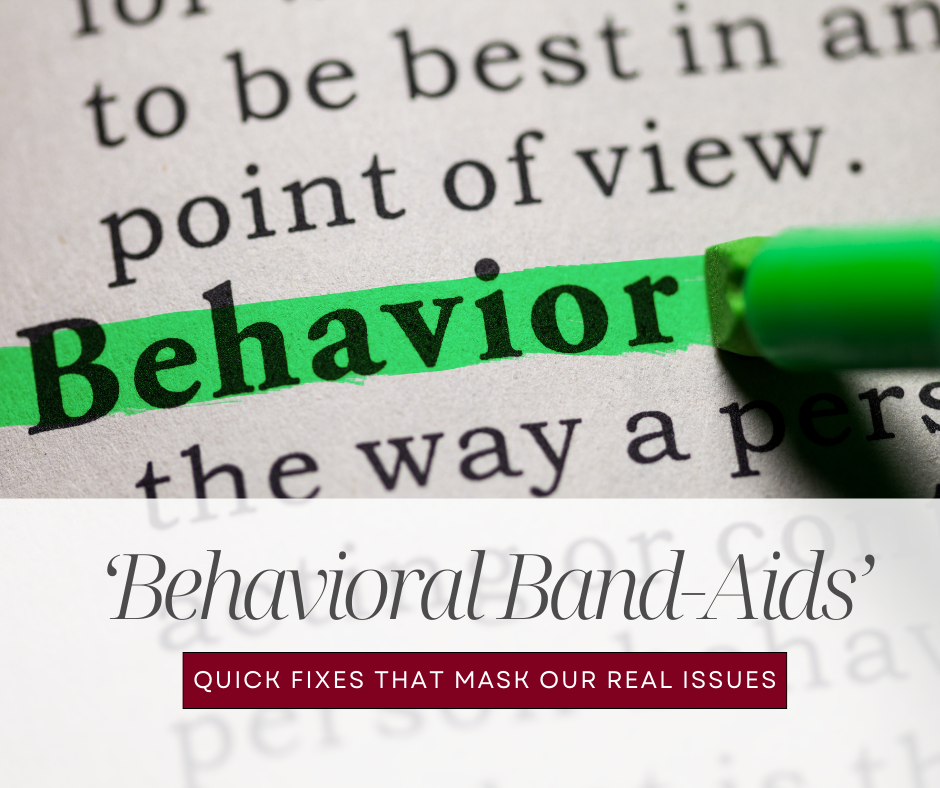The Quick Fix Approach: Behavioral Band-Aids
In today's fast-paced world, we often find ourselves searching for easy solutions to complex problems. One concept that has gained traction is that of "behavioral band-aids." Imagine putting a band-aid on a wound without treating it – it covers the issue temporarily, but the real problem still exists.
Picture this: you're feeling stressed about work, so you indulge in a shopping spree to temporarily lift your mood. While shopping might make you feel better momentarily, it doesn't address the underlying stressor. It may even create new issues with having more things to organize at home, less space, and financial struggles. This is a classic example of a behavioral band-aid. It's like using a band-aid to stop a leak in a pipe – it might slow the leak, but the pipe still needs proper fixing.
Why Do We Rely on Behavioral Band-aids?
Behavioral band-aids are enticing because they provide immediate relief. They give us a sense of control and help us avoid confronting the bigger issues at hand. Plus, they're often easier and quicker to implement than long-term solutions. However, just like skipping meals can't replace a balanced diet, relying on behavioral band-aids won't lead to lasting improvement.
While behavioral band-aids might seem harmless, they can actually hinder our personal growth and development. If we constantly opt for temporary solutions, we're essentially avoiding personal challenges and missing out on opportunities to learn and evolve. Over time, this can lead to a cycle of repeated problems and frustrations.
To break free from the behavioral band-aid cycle, it's essential to identify and address the root causes of our problems. This requires self-awareness and a willingness to tackle uncomfortable situations head-on. Instead of shopping to relieve stress, we could explore healthier stress management techniques like exercise, meditation, or seeking support from friends and family.
Steps to Overcome Behavioral Bandaids
Acknowledge the Tendency: The first step is recognizing when you're using a quick fix to cover up a deeper issue.
Identify the Root Cause: Take time to understand what's truly causing the problem. Is it stress, unfulfillment, or something else?
Seek Long-Term Solutions: Instead of opting for the easy way out, explore sustainable solutions that address the root cause. This might involve seeking professional help, changing habits, or adjusting your perspective.
Practice Patience: Real change takes time. Be patient with yourself as you work towards lasting solutions.
We often turn to "Behavioral Band-aids," to cope with immediate stressors. They might provide momentary relief, but they don't offer the lasting transformation we truly need and they sometimes create more problems for us. By recognizing our tendency to opt for quick fixes, identifying the root causes of our challenges, and embracing sustainable solutions, we can break free from the cycle of temporary cover-ups and pave the way for genuine personal growth and well-being. At times, we only need someone who can give us the space to hear us out and acknowledge what we are going through while at others we might need more than that to be able to make the changes we wish to see on ourselves.
If you’d like additional support creating or breaking habits, understanding why you do the things you do, and finding new ways to cope with stress and life challenges, click here to request a session.
I am a PhD in Clinical Sexology candidate at Modern Sex Therapy Institutes and have a Master of Science in Educational Psychology. I work with individuals, couples, non-monogamous relationships, and groups in topics related to sexuality, emotional regulation, communication dynamics, and changing behaviors.


